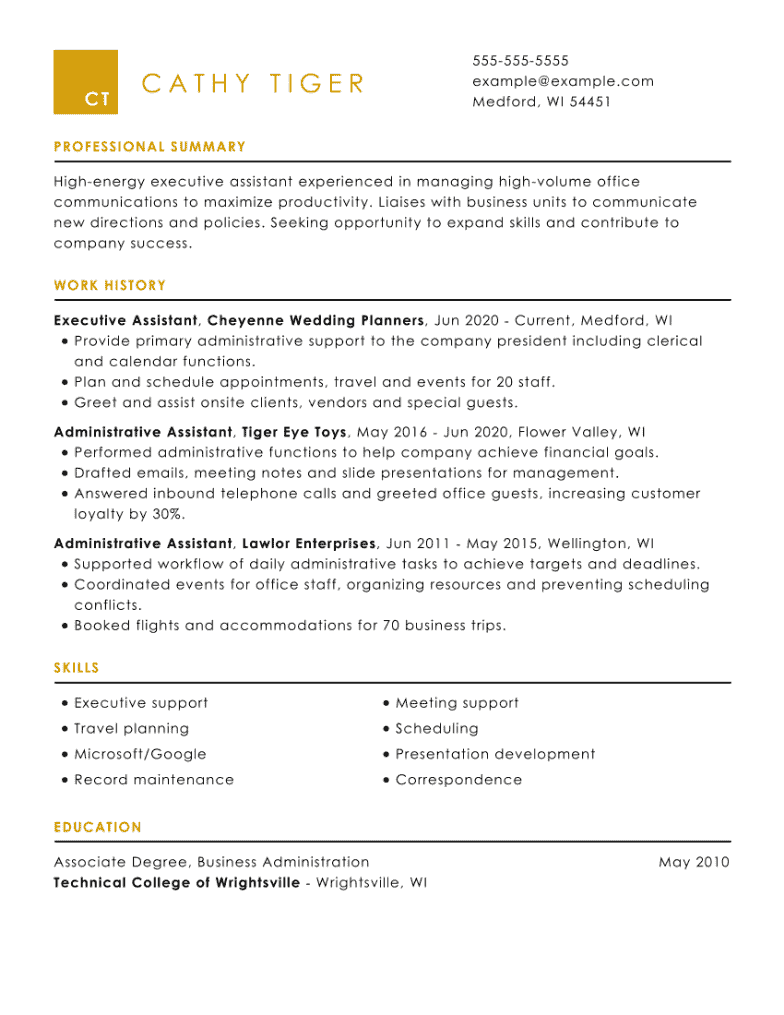Executive Assistant Resume Examples for 2024
To become an executive assistant, you first need to wow a hiring manager. Here's executive assistant resume examples and tips to help you do just that.
We personalize your experience.
We use cookies in our website to ensure we give you the best experience, get to know our users and deliver better marketing. For this purpose, we may share the information collected with third parties. By clicking “Allow cookies” you give us your consent to use all cookies. If you prefer to manage your cookies click on the “Manage cookies” link below.
To become an executive assistant, you first need to wow a hiring manager. Here's executive assistant resume examples and tips to help you do just that.

Use this executive assistant resume example as a template for your own resume, following its organization and structure.

An executive assistant helps ensure that the higher-ups of a company are able to do their jobs without having to worry about tasks like managing a schedule, taking calls, or making travel arrangements. The job description of an executive assistant may include just about anything, as executive assistants might be counted onto providing administrative support, preparing expense reports, and even creating a filing system for the office. If you’re writing your executive assistant resume, here are some things to keep in mind.
Create your resumeTypically, the best thing to highlight in an executive assistant resume is your ability to multitask. If you want to highlight your ability to become an executive assistant, you want to show off the fact that you’re able to “go with the flow” on anything the executives need. You should also highlight your skill in collaborating with people whose jobs revolve around project management and your professional experience in being an assistant.
Create your resumeYour resume structure will be slightly different depending on the resume format you choose. The most common options are the chronological format, which highlights work experience, the functional format, which highlights skills, and the combination format, which attempts to highlight both. However, your resume sections will typically be similar, although you may need to reorder them depending on your format
First is the header. This is the section of the resume that goes at the very top of your resume and includes your name and contact information. It may also include your resume headline, which is a one-sentence line that gives a hiring manager the basics about your job title and how many years of experience you have.
The next section is your resume summary or resume objective. A good executive assistant resume summary shows recruiters a general overview of your resume, allowing them to get a better idea of who you are. Typically, a resume summary is for more experienced individuals and gives an overview of your past experience, while a resume objective is for entry-level individuals and gives an idea of where you’re hoping to go.
Your skills section needs to include both hard skills and soft skills, showing that you know how to interact with other people and that you know how to perform the duties that an assistant position often requires. Here are some examples of hard and soft skills you can list to help you show off your skill set:
When writing your resume, make sure you’re including your top skills, including skills that you can showcase through your administrative experience. If you have any certifications for skills, include those as well.
Next is the work experience
section. If you’re applying to be a senior executive assistant or another more advanced administrative professional, you should have work experience in the field of an executive assistant. However, if you don’t have these experiences, you may be able to find an entry-level job if you have experience in similar fields. Look at other administrative resume examples and see what they list in their work history. You may be able to list positions in business administration, for example, as long as you can relate them to administrative positions.
The education section may or may not be important for the company that you’re applying to. Check the executive assistant job description to see what education the company is looking for. Include college experience if you have any, and only add your high school experience if you have no college experience otherwise.


Have questions? We’re here to help.
Yes. You should include cover letters any time you apply for a job. Make sure you use a cover letter builder to create a cover letter that looks nice, reads well, and pairs with an executive administrative assistant resume effectively.
Point the hiring manager toward the experience that you do have (e.g., extracurricular activities, internships). Even if this experience isn’t actually in the field of executive assistant work, any activities you’ve taken part in that speak to the skills necessary to be a great executive assistant can be helpful.
It’s always important to read the job application to find out which keywords
are important for the job you’re applying to. Resume keywords are critical to getting an interview, and if you want a hiring manager to give your cover letter a second look, you need to match what the job application is looking for.
Couldn't find the answer you're looking for?